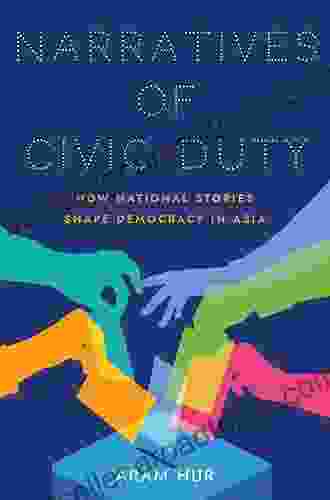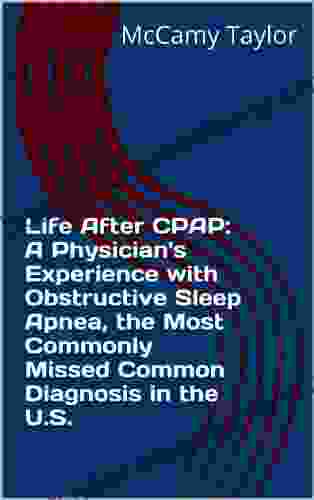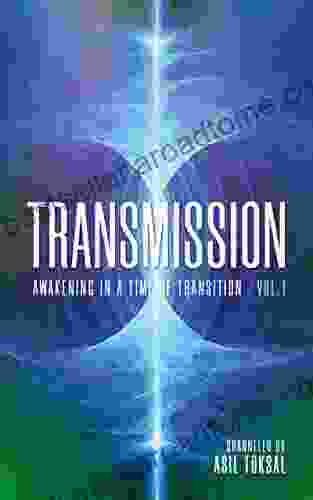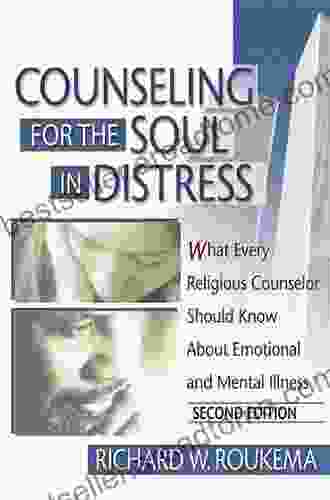Counseling for the Soul in Distress: A Comprehensive Guide to Healing and Hope

In the face of life's inevitable challenges, it is natural to feel overwhelmed and distressed. Sometimes, the weight of our burdens can seem unbearable, leaving us feeling lost, alone, and hopeless. If you find yourself struggling with emotional pain, anxiety, or depression, know that you are not alone. There is help available, and counseling can be a transformative journey towards healing and hope.
5 out of 5
| Language | : | English |
| File size | : | 913 KB |
| Text-to-Speech | : | Enabled |
| Screen Reader | : | Supported |
| Enhanced typesetting | : | Enabled |
| Word Wise | : | Enabled |
| Print length | : | 296 pages |
What is Counseling?
Counseling is a form of therapy that involves working with a trained professional to address mental health concerns and personal challenges. Through confidential and compassionate conversations, counselors help individuals understand their thoughts, feelings, and behaviors. They provide a safe and supportive space for clients to explore their inner world, gain self-awareness, and develop coping mechanisms.
Benefits of Counseling
Counseling offers numerous benefits for those seeking to improve their emotional well-being. Some of the key benefits include:
- Reduced Distress: Counseling provides a safe outlet for expressing and processing difficult emotions, leading to a reduction in anxiety, depression, and stress.
- Enhanced Self-Understanding: Through self-reflection and guidance from the counselor, individuals gain a deeper understanding of their thoughts, feelings, and behaviors, empowering them to make informed choices.
- Improved Coping Mechanisms: Counselors equip clients with practical strategies for managing stress, resolving conflicts, and overcoming challenges, increasing their resilience.
- Strengthened Relationships: By improving communication skills and fostering self-awareness, counseling can enhance interpersonal relationships and reduce conflict.
- Increased Hope: Counseling provides a beacon of hope in times of despair. Through validation, support, and a renewed sense of purpose, individuals can rediscover their inner strength and envision a brighter future.
Types of Counseling
There are various types of counseling available, each tailored to address specific needs and preferences. Some common types include:
- Talk Therapy: This involves talking with a counselor about one's thoughts, feelings, and experiences in a confidential setting. Talk therapy can help individuals process emotions, develop insights, and gain coping skills.
- Cognitive-Behavioral Therapy (CBT): CBT focuses on changing unhelpful thought patterns and behaviors that contribute to distress. It emphasizes the connection between thoughts, feelings, and behaviors, and teaches clients how to challenge negative thoughts and develop healthier coping mechanisms.
- Humanistic Therapy: This approach emphasizes the individual's potential for growth and self-actualization. Humanistic therapists create a warm and supportive environment where clients can explore their values, beliefs, and purpose.
- Psychodynamic Therapy: Psychodynamic therapy delves into the unconscious mind and explores how past experiences and relationships shape present-day thoughts and behaviors. This therapy helps individuals understand their inner conflicts and gain insight into their emotional patterns.
- Group Therapy: Group therapy involves working with a group of individuals who are facing similar challenges. It provides a sense of community, support, and shared experiences, while offering opportunities for learning and growth.
Finding the Right Counselor
Finding the right counselor is crucial for a successful therapeutic experience. Here are some factors to consider:
- Credentials: Ensure the counselor is licensed and has the necessary training and experience in the type of therapy you are seeking.
- Specialization: Consider whether the counselor specializes in working with individuals facing specific challenges, such as anxiety, depression, or trauma.
- Approach: Choose a counselor who employs an approach that resonates with you and supports your goals.
- Personality: It is important to feel comfortable and have a good rapport with your counselor. Trust and open communication are essential for a therapeutic alliance.
How to Get Started
If you are considering counseling, here are the steps to get started:
- Decide if Counseling is Right for You: Explore the benefits and challenges of counseling to determine if it is the right path for you.
- Find a Counselor: Research different counselors and their approaches to find one who aligns with your needs.
- Schedule an Appointment: Contact the counselor and schedule an initial consultation to discuss your concerns and goals.
- Be Open and Honest: During your sessions, be open and honest about your thoughts, feelings, and experiences. This will allow the counselor to understand your needs and develop an effective treatment plan.
- Engage Actively: Counseling is a collaborative process. Participate actively in your sessions and complete any recommended exercises or assignments.
- Be Patient: Counseling takes time and effort. Don't get discouraged if you don't see immediate results. Trust the process and keep working with your counselor.
Counseling for the soul in distress is a transformative journey that empowers individuals to heal from emotional pain, overcome challenges, and rediscover hope. By working with a qualified counselor, individuals can gain self-awareness, develop coping mechanisms, and cultivate inner strength. If you are struggling with emotional difficulties, know that there is help available. Embrace the opportunity for growth and healing through counseling, and take the first step towards a brighter future.
5 out of 5
| Language | : | English |
| File size | : | 913 KB |
| Text-to-Speech | : | Enabled |
| Screen Reader | : | Supported |
| Enhanced typesetting | : | Enabled |
| Word Wise | : | Enabled |
| Print length | : | 296 pages |
Do you want to contribute by writing guest posts on this blog?
Please contact us and send us a resume of previous articles that you have written.
 Book
Book Novel
Novel Page
Page Chapter
Chapter Text
Text Story
Story Genre
Genre Reader
Reader Library
Library Paperback
Paperback E-book
E-book Magazine
Magazine Newspaper
Newspaper Paragraph
Paragraph Sentence
Sentence Bookmark
Bookmark Shelf
Shelf Glossary
Glossary Bibliography
Bibliography Foreword
Foreword Preface
Preface Synopsis
Synopsis Annotation
Annotation Footnote
Footnote Manuscript
Manuscript Scroll
Scroll Codex
Codex Tome
Tome Bestseller
Bestseller Classics
Classics Library card
Library card Narrative
Narrative Biography
Biography Autobiography
Autobiography Memoir
Memoir Reference
Reference Encyclopedia
Encyclopedia Annette Blake
Annette Blake Anuradha Bhagwati
Anuradha Bhagwati Arabella Lennox Boyd
Arabella Lennox Boyd Michael Nowicki
Michael Nowicki James C Kaufman
James C Kaufman Anthony Vizcarrondo
Anthony Vizcarrondo Kaelin Munkelwitz
Kaelin Munkelwitz Paul Chaplin
Paul Chaplin Vivien Goldman
Vivien Goldman Asamod Ka
Asamod Ka Anna Cornelia Beyer
Anna Cornelia Beyer Annabelle Thorn
Annabelle Thorn Iyanla Vanzant
Iyanla Vanzant Arielle Essex
Arielle Essex Marianne Rittner Holmes
Marianne Rittner Holmes Ash Cash
Ash Cash Anthony Bailey
Anthony Bailey Jane Alexander
Jane Alexander Antonio Pimentel
Antonio Pimentel Gaia Cornwall
Gaia Cornwall
Light bulbAdvertise smarter! Our strategic ad space ensures maximum exposure. Reserve your spot today!

 Christian CarterIndesign Type: The Ultimate Guide to Professional Typography with Adobe...
Christian CarterIndesign Type: The Ultimate Guide to Professional Typography with Adobe... Ryūnosuke AkutagawaExtended Papers From The Multiconference On Signals Systems And Devices 2024:...
Ryūnosuke AkutagawaExtended Papers From The Multiconference On Signals Systems And Devices 2024:...
 Abe MitchellHow National Stories Shape Democracy in Asia: Studies from the Weatherhead...
Abe MitchellHow National Stories Shape Democracy in Asia: Studies from the Weatherhead... Greg FosterFollow ·19.1k
Greg FosterFollow ·19.1k Houston PowellFollow ·14.7k
Houston PowellFollow ·14.7k Truman CapoteFollow ·14.8k
Truman CapoteFollow ·14.8k W.H. AudenFollow ·18.7k
W.H. AudenFollow ·18.7k Donovan CarterFollow ·11.1k
Donovan CarterFollow ·11.1k Cooper BellFollow ·4.1k
Cooper BellFollow ·4.1k George BellFollow ·18.5k
George BellFollow ·18.5k Dave SimmonsFollow ·16.7k
Dave SimmonsFollow ·16.7k

 Jeremy Cook
Jeremy CookDrawing and Illustrations of the 18th Century: A Journey...
Step into the...

 Easton Powell
Easton PowellPhysician Experience With Obstructive Sleep Apnea: The...
Obstructive sleep apnea (OSA) is a common...

 Cruz Simmons
Cruz SimmonsUnlock Your Inner Healer: The Transformative Power of...
Are you ready to embark on a profound healing...

 Paulo Coelho
Paulo CoelhoTransmission Awakening In Time Of Transition Vol. 1: A...
Transmission Awakening...
5 out of 5
| Language | : | English |
| File size | : | 913 KB |
| Text-to-Speech | : | Enabled |
| Screen Reader | : | Supported |
| Enhanced typesetting | : | Enabled |
| Word Wise | : | Enabled |
| Print length | : | 296 pages |










